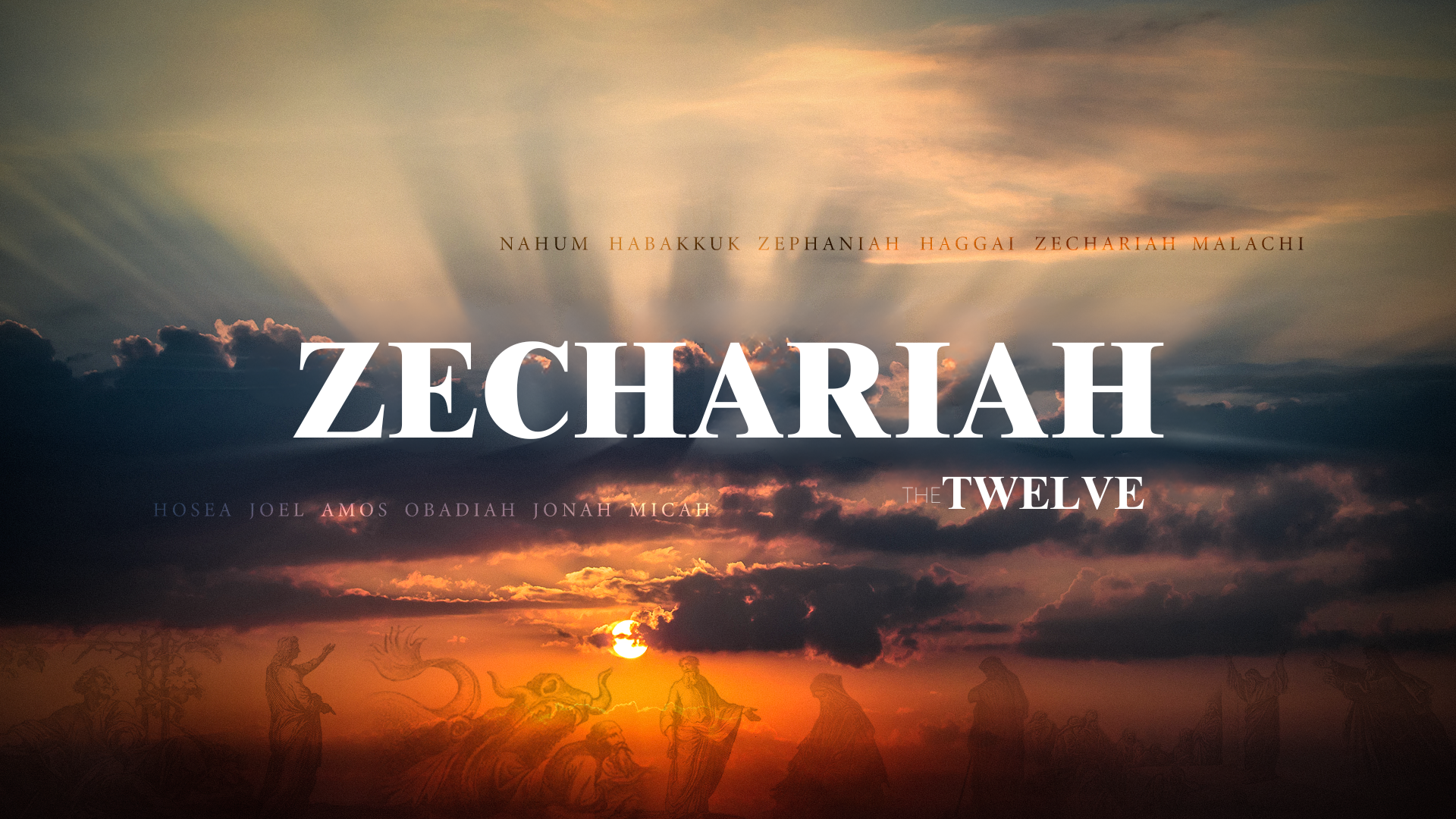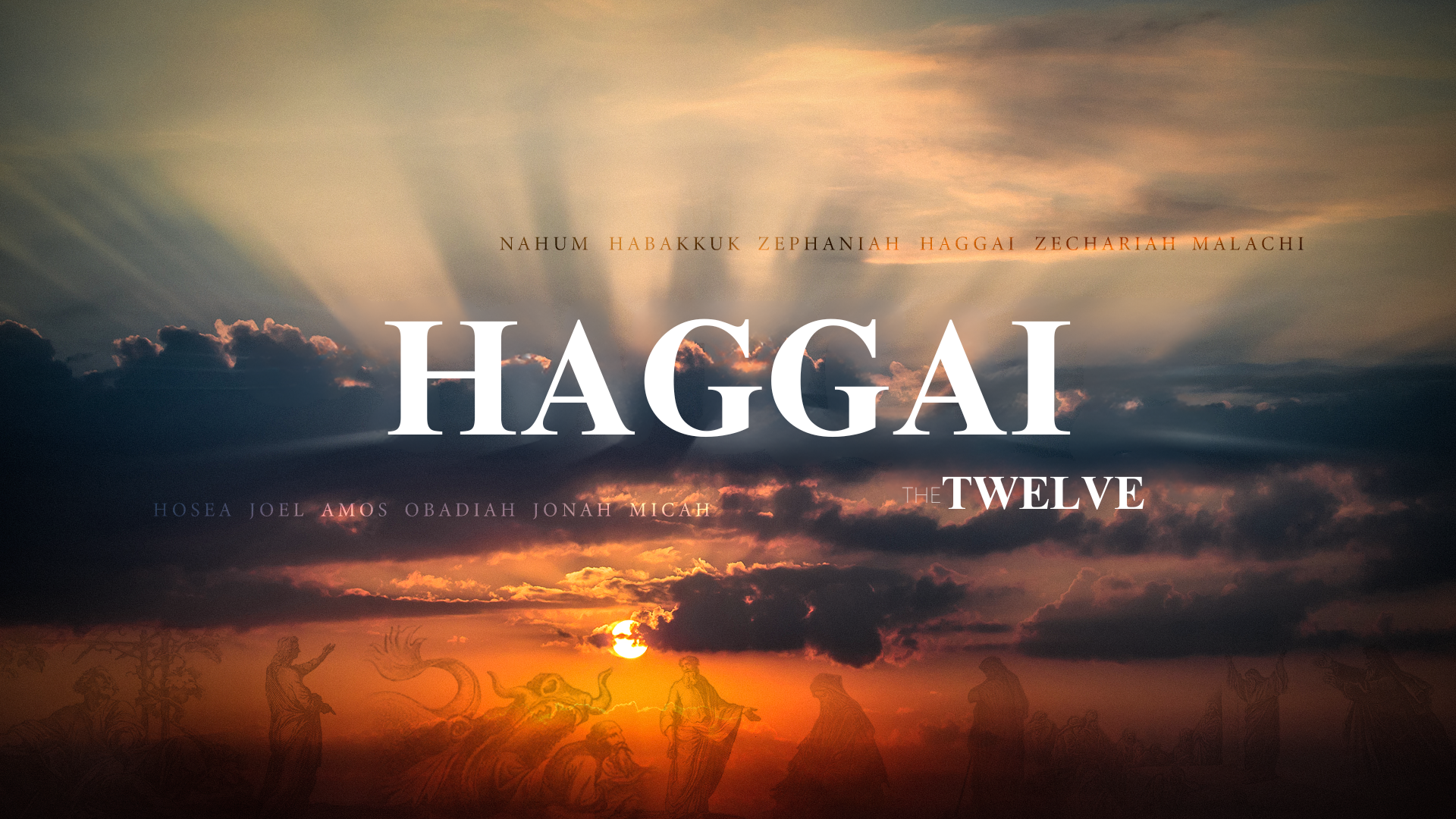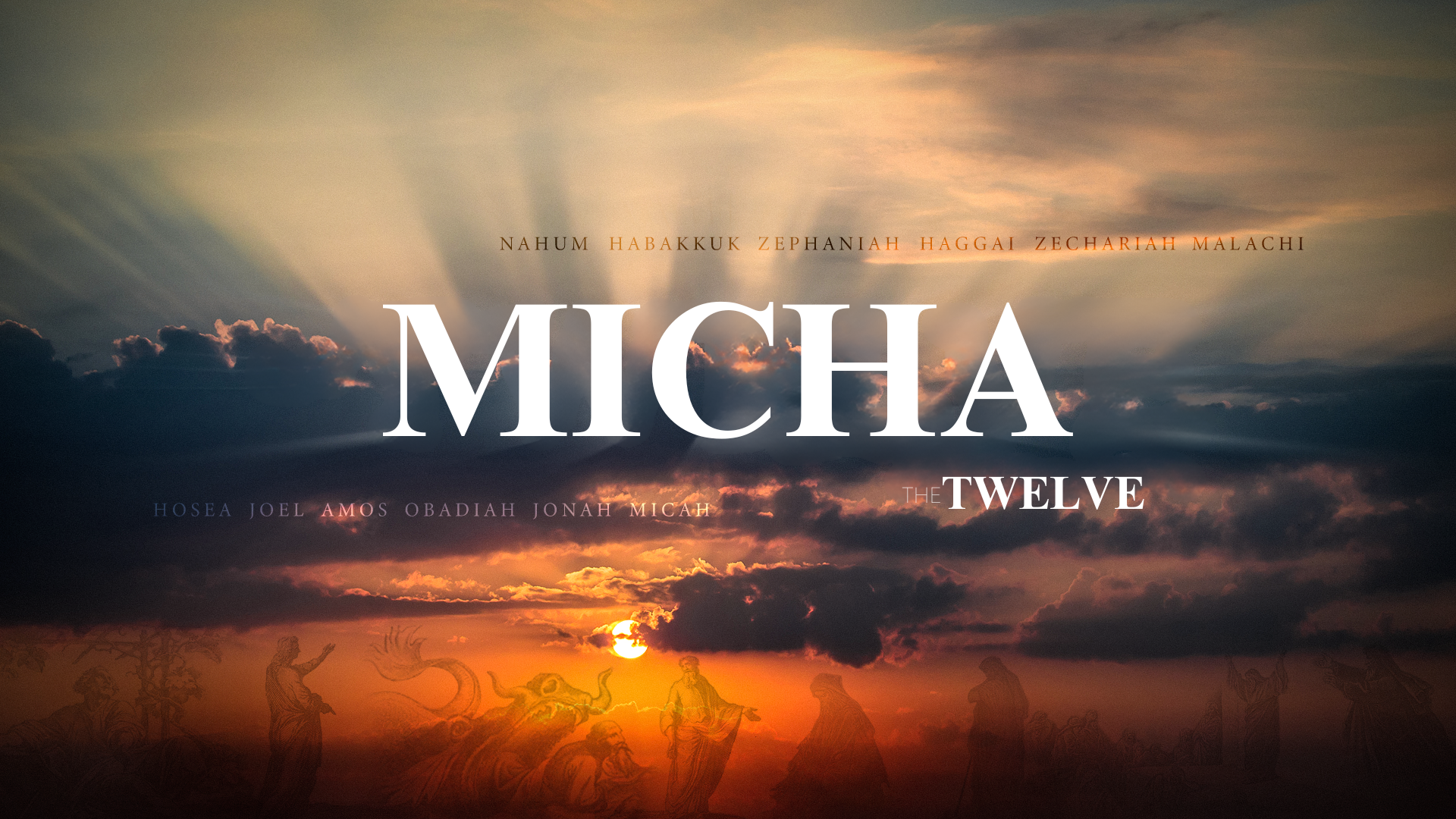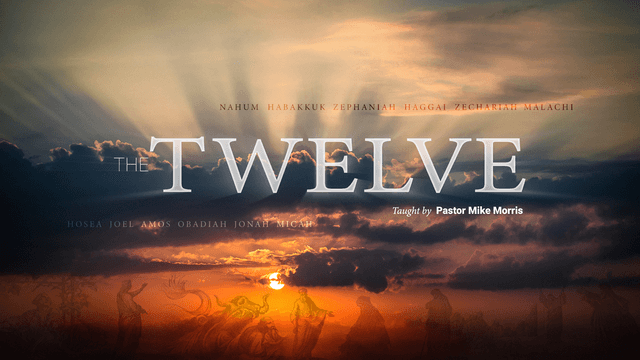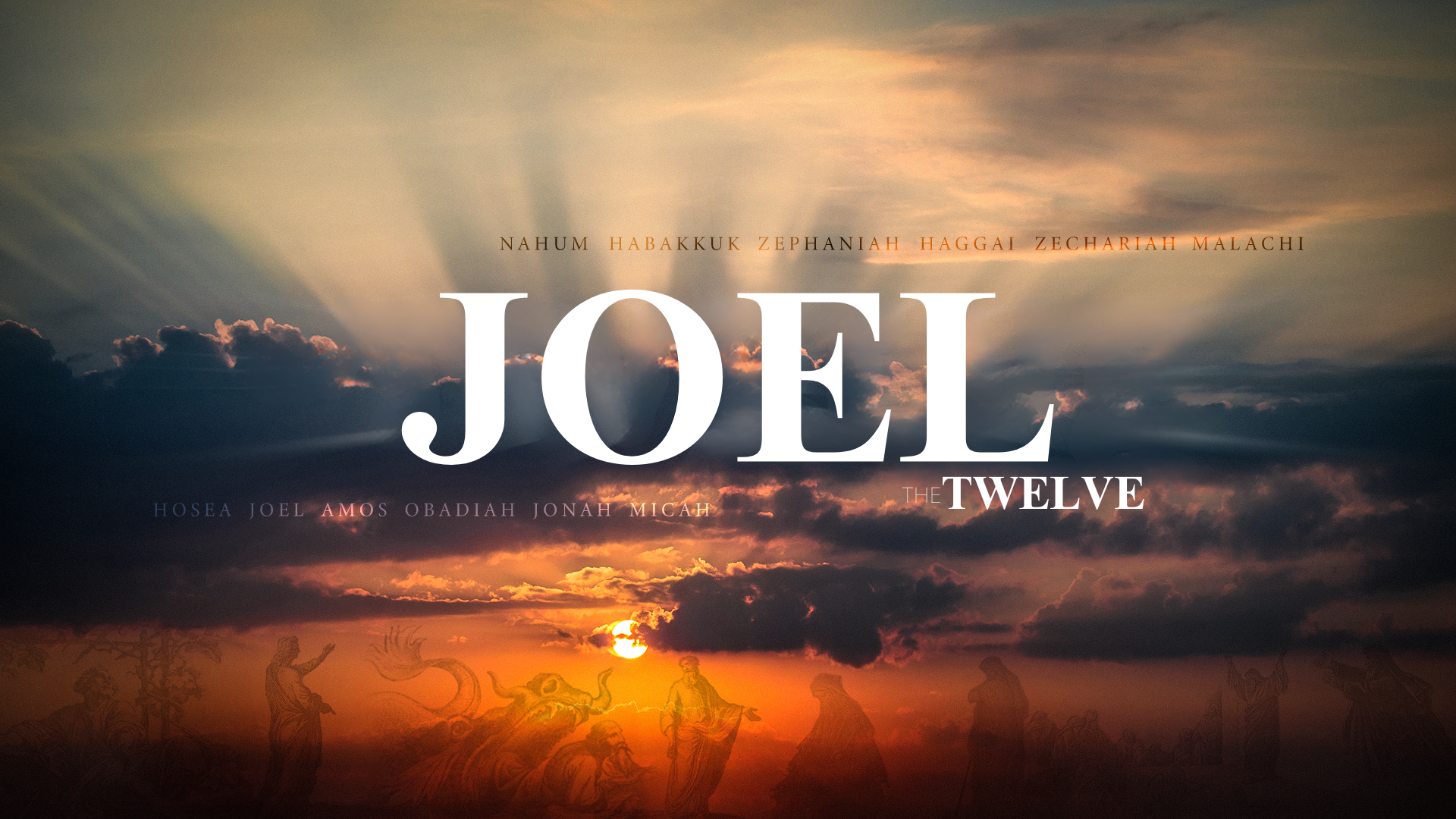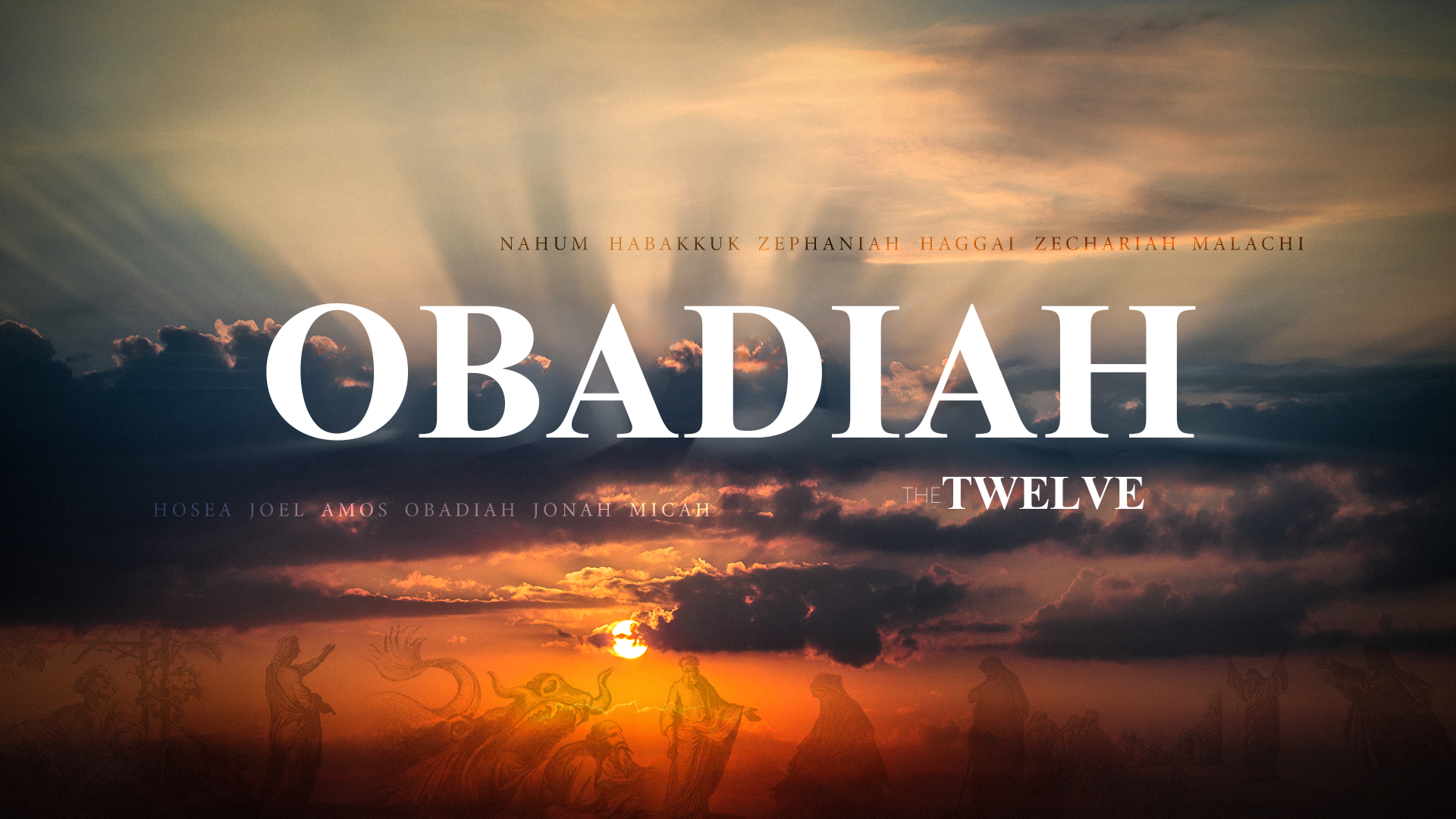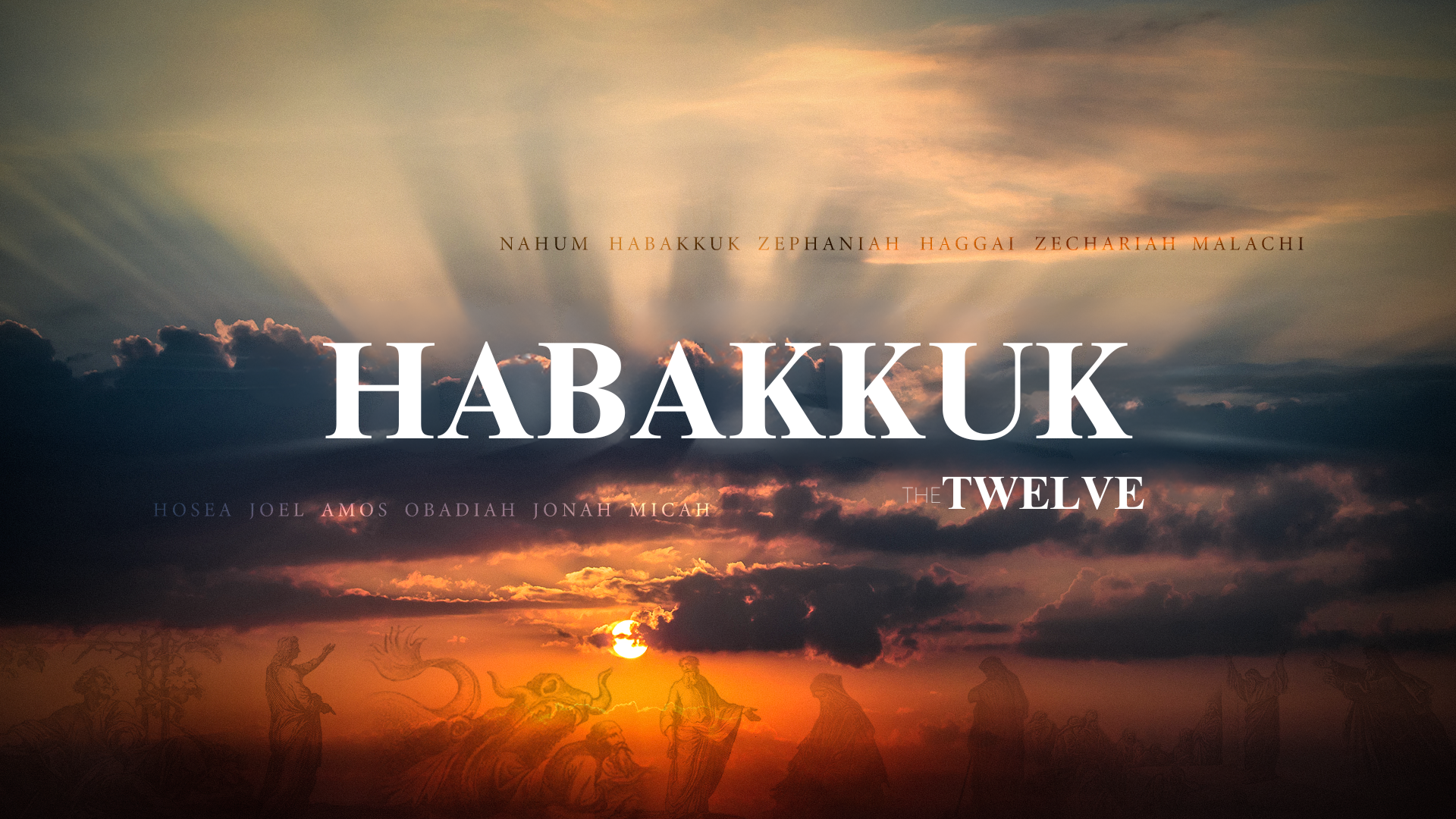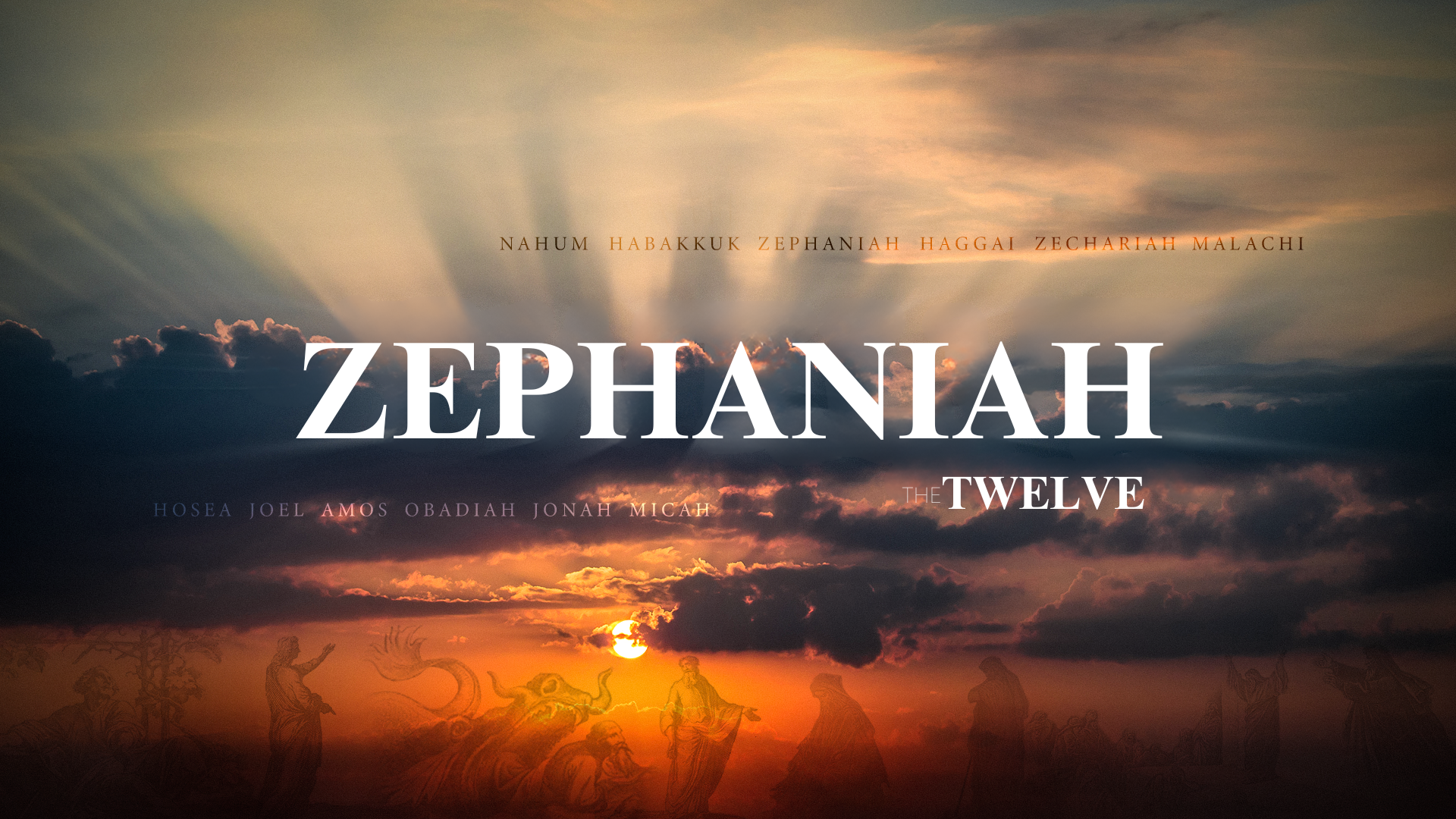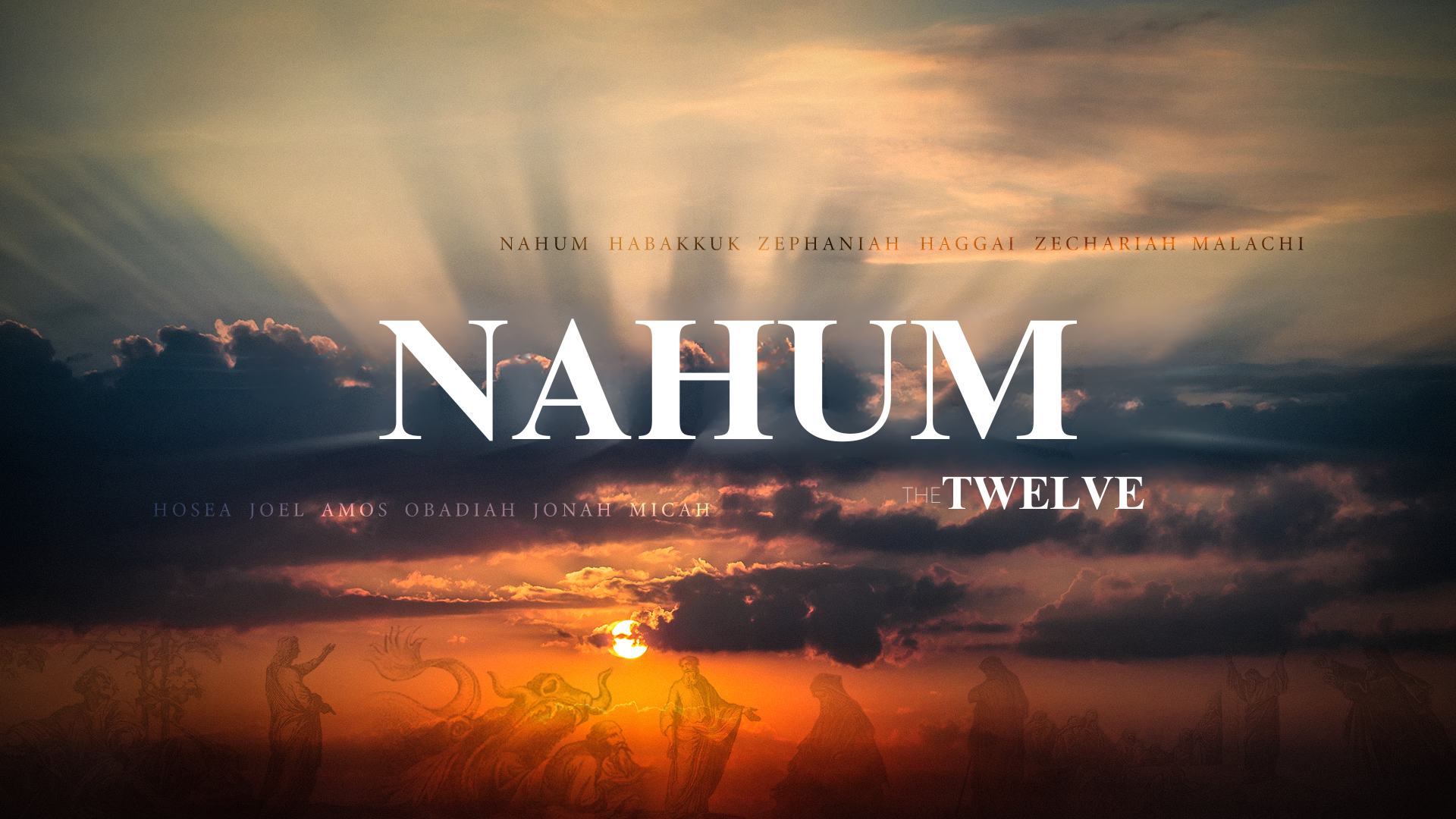MANUSCRIPT
Last week we looked at the first portion of chapter 7, the final chapter in this wonderful book...today, we’ll quickly review the lessons we’ve learned from this prophet and finish with verses 14 through 20...
The book of Micah is the transitional prophecy of the Twelve, the bridge between the prophets who spoke primarily to Israel in the north and those who spoke primarily to Judah in the south...with Micah’s prophecy, the leadership and people of Judah are beginning to hear the clear warning of God prior to the judgment of the Babylonian exile, but they are ending on a note of glorious praise as the book concludes...
Author: Micah of Moresheth, a town in Judah, west of Jerusalem...not much is known of Micah, but he was a respected prophet, having spoken directly to King Hezekiah of Judah...
Structure: The text breaks into three parts, or oracles: chapters 1 and 2, chapters 3 through 5, and chapters 6 and 7...each begins with a call to “hear the word of the Lord”...within each oracle there are alternating passages of judgment and restoration...
Themes: There are two dominant themes...
Judgments against sin, particularly against idolatry and injustice
Assurances of hope, to be realized mostly in the “latter days”
Another distinctive about this book is its focus on Messiah, a figure we know well from Isaiah, a contemporary of Micah...we see Messiah’s birthplace only here, and we find him referred to as king in chapter 2...in chapter 4 we see the outlines of his reign, described by Micah as in “the latter days”...and we see him called “the shepherd” in chapters 5 and 7...for the Old Testament, this is a very Jesus-centered book
Micah prophesies God’s coming judgment, causing him to cry out over the destruction of Samaria and Israel, and also the coming destruction of Jerusalem and Judah...his brokenness is evident in chapters one and seven, with heartfelt laments expressed in both the beginning and the end of the book...
But despite the unrepentant hearts and grievous sins of the people and the judgment they deserve, that isn’t the end of the story...the Lord will raise up a righteous and compassionate Shepherd-King for His people, restoring them and affirming His faithfulness, and ultimately the Lord and His people are victorious...
As we reflect on the first two chapters of the book, there are some lessons for us to learn and apply...
We need to see our world, and the events of our world, through the same lens as Micah...historical events don’t “just happen” -- they happen in the context of the work and purpose of the sovereign God...the Lord God is still on His throne and still governing His creation, even today...
Also, our study of these biblical prophetic books is meaningful even today...we can’t condemn Israel or Judah for their sins without recognizing that we are also culpable, especially in the church...should we not walk in righteousness before Him? Should we not refuse the twisted and changing message of false teachers who can be bought for a price? Should we not demand accountability for basic ethical behavior from our leaders? Should we not care for the weak, the orphaned, the widowed, the troubled, the poor? Yes, we must...
Finally, we can never presume on God and His grace...we must hear the words of Peter in I Peter 4.17...
17 For it is time for judgment to begin at the household of God; and if it begins with us, what will be the outcome for those who do not obey the gospel of God?
In the middle of the book, we turn from the theme of rebuke to the theme of restoration, with a focus on the word, “hope”
After a relentless rebuke of God’s people, God now gives them a shining vision of hope for the future...as bad as things were, as bad as they were still to become, they would not always be that way...for the Almighty God is still good and faithful, and after His rebuke will come hope and restoration and life...in the latter days...
In the Jerusalem of these latter days, the leader is the Lord Himself...
He will teach the people His ways, not relying on the greedy prophets and priests...
He will judge between peoples and decide disputes for strong nations, not depending on unethical and bribe-seeking judges in the city gates...
Instead of widespread ignorance and rejection of the word of the Lord, people from all nations will seek to know His ways and walk in His paths...
And the glory that will be lost in the Babylonian destruction of the Temple will be restored as Jerusalem becomes again the “mountain of the house of the Lord,” transformed from a wooded hill to the highest of the mountains...
There is much to learn from this restoration narrative...
First, this passage both promises and reminds us that there is hope in the Lord...Paul affirms the gift of hope in the book of Romans...Romans 15.4...
4 For whatever was written in former days was written for our instruction, that through endurance and through the encouragement of the Scriptures we might have hope.
Second, a message we know well: keep your eyes on eternity...remember that the turmoil and drama of this world will pass, for it is not the end state of human history...the pain and death of these days will not always be...to quote Micah, “It shall come to pass...for the mouth of the Lord of hosts has spoken”
What does this restoration look like? Let’s see what the text says...
He will claim for Himself a remnant of His people and will restore that remnant
The remnant of Israel will experience judgment and exile, specifically in Babylon
But that the Lord will rescue that remnant from Babylon
And that ultimately, Jerusalem will destroy their enemies through the power of their covenant God
“In that day” of restoration, He says He will accomplish three things...
He will gather His people...and His people are described as the lame, those who have been driven away, the afflicted...this verse brings to mind a lost flock of sheep, alone in the wilderness, without a shepherd to care for them...now the Lord says, “I will be their Shepherd once more” -- He will assemble them together into a flock...the sheep no one else wanted...
And when God has gathered His people, He will transform them into a “strong nation,” those driven away into exile and afflicted...by God’s Hand, this collection of weak, lame, afflicted cast offs will become the remnant and a strong nation...His incomparable power to raise and restore is the basis for His promise to Israel...
And having gathered them and transformed them, God will reign over them forevermore as their Sovereign King from Mount Zion in Jerusalem...they shall be His people completely, as they were always intended to be...Jeremiah 30.22 will be fully and eternally true...And you shall be my people, and I will be your God.”...the flock has been gathered and changed into a remnant of strength, no longer in weakness, and their great and good Shepherd-King shall rule over them in righteousness and love...
What do we learn from this detailed view of the hope of Israel?
God chooses the weak things of the world to shame the wise...and He makes of them a great nation...we’re just like that...few of noble birth, few of wealth, few of high standing...God exalts Himself best through using the least of these...He is already in the process of transforming us into the image of His blessed Son, and He will transform His remnant into a strong nation, and we shall live and serve under His sovereign lordship forever...
God uses judgment, adversity, and suffering to affect that transformation...there will be glory, but He first uses trials to burn away the dross in us, the impurity, so that we are suited for that glory...so when those trials come, accept them as a gift from God intended for your good, and look for His purpose in them...
Rejoice that you are in the flock of God by His grace...accept and learn from the adversity and suffering He brings to your life...and always turn to the Holy Spirit to know and understand our Lord and His ways...
Chapter 5, at the end of the second oracle, is a pivotal moment in the book and the theological center of Micah’s prophecy...
The chapter has three closely related passages...
The work of God in and through Israel’s Shepherd-King, our Saviour, Jesus Christ
The work of God through the remnant of Jacob, His people
The work of God in the remnant of Jacob, His people
This is the center of the book because this promised Ruler in Israel, brought forth from and for the covenant God, is everything the earthly leaders of the nation were not...He is of David’s line, a Branch from the stump of Jesse, perfectly righteous and holy...as we now see looking back to the cross, Jesus Christ, born in Bethlehem according to Micah’s prophecy, was born into obscurity, not prominence, poverty, not wealth, and is the ultimate fulfillment of the great Shepherd-King foretold here...Micah 5.2...
But you, O Bethlehem Ephrathah,
who are too little to be among the clans of Judah,
from you shall come forth for me
one who is to be ruler in Israel,
whose coming forth is from of old,
from ancient days.
Let’s look carefully at what we need to learn from this important chapter...
Don’t look to people for deliverance or salvation...they cannot do what only God can do
We have a Great and Good Shepherd-King...we’re not here in a hostile enemy-occupied territory, fighting the good fight all on our own...His Holy Spirit is both with us and in us...and He has given us everything we need for life and godliness...so stand strong
Take the gospel to the world...if they receive it, we will be as life-giving rain from the Lord to them...but if they refuse, all that remains is a certain judgment...but remember, our job is to tell -- not convince, persuade, or save -- we are not the Holy Spirit, but we can share His truth...
In the final oracle of the book, chapters 6 and 7, we find ourselves in a court room...the Lord God is the judge, but He’s also the plaintiff in this case...Micah is the prosecuting attorney, and Israel stands in the dock as the defendant...God calls creation to stand and hear His indictment against His people...and God begins with recounting His goodness in four righteous acts of the Lord in the Exodus, Micah’s reminders to the people of Israel...God’s goodness to Israel should prompt us to ask ourselves some questions...
From what has God delivered you? What situation did you think was hopeless, but God overcame your circumstances?
What godly leaders has the Lord placed in your life? Mentors, friends, parents...for whom do you give thanks to God?
How has God protected you from temptation and evil? To think of it another way, what has the world, the flesh, and the devil meant for evil, but that God has turned to your good?
How has God led you into a new place of blessing? Has He moved you from the wilderness of confusion and anxiety to a new place, a place He made just for you, where you are truly home?
What he says next in chapter 6 verse 8 has been called “the finest summary of the content of practical religion to be found in the OT.” and “a one-line summary of the whole Law.”
8 He has told you, O man, what is good;
and what does the Lord require of you
but to do justice, and to love kindness,
and to walk humbly with your God?
In this chapter, we listen as Micah cries out in pain and suffering in the first six verses, but then we hear his focus change in the second portion of the text, verses 7 through 13, as Micah speaks of his faith and trust in the Lord, and he looks beyond the destruction of Jerusalem to God’s victory over sin, death, and hell...
For Micah, there were three reasons to lament:
The godly have perished
The leaders are corrupt
Relationships are broken...no trust remains
When we are heartbroken, where do we turn? What do we do? Look to Micah’s example: Look to the Lord -- wait for Him -- and trust that He hears your cries...for we trust in Him because of Who He is.
But compared to the first part of chapter 6, the second part is entirely different...judgment has now come upon the nation in full...Jerusalem is held captive by a foreign power, mocked by those around her, confined and still, in the darkness...she’s exactly where she needs to be for the Lord to restore her to Himself...
Here we begin to see another side of the character of God...He is certainly a God of the covenant, Who will hold His people accountable for their sins...but He is also a God of justice, Who ultimately will not let evil triumph over good, Who has the capacity and the will and the obligation from His nature to judge sin, and Who will uphold and vindicate His people against their enemies...those enemies will be held accountable for, and punished for, their cruelty, and part of their punishment will be to see the promised vindication of those whom they persecuted...
And this is another of the important truths we learn from Micah...there is a good and proper tension we feel between the justice and wrath of God, and the love and mercy of God...
But as we think about these things, let us consider some questions...
What causes us to lament before the Lord? Is it only personal difficulty, or even suffering within our circle of family and friends? Or, like Micah, and Jesus, are we heartbroken over the ungodliness in our world, the corruption of our leaders, and the destruction of our society caused by sin and unrepentant sinners? May God forgive us for our indifference...and may our perspective widen to see our world as God does, and seeing it, to weep...
What should we do when everything is falling apart? Like Micah, trust in the Lord...for ultimately only He is trustworthy...recognize that our faith must rest in Him, not other people, even those closest to us...when adversity and confusion and difficulty come, trust in Him...Psalm 56.3...
3 When I am afraid,
I put my trust in you.
How do we respond to the discipline of God? Do we accept what He is bringing to us, acknowledging that He is just and right in all of His ways, and that undergirding His discipline is His everlasting love? But at the same time, from the darkness, do we trust that He will bring us out, restore us to the light? Do we allow ourselves to fall into despair and hopelessness, or do we trust in His faithfulness and goodness, knowing that He is not finished with us, and that He will use our pain to advance His work, to further transform us into the image of Christ?
Now we come to the final passage in the book...chapter 7, verses 14 through 20...
As chapter 7 concludes, Micah presents one of the most vexing problems in Scripture...how can the thrice-holy God forgive sin and pardon transgressions, without compromising His holy character? We find the answer here described in outline in the conclusion of Micah’s prophecy...
This short passage breaks into two portions, a dialogue between the Lord and Micah in verses 14 through 17, then a doxology in the final three verses...let’s begin at verse 14...
“Shepherd your people with your staff,
the flock of your inheritance,
who dwell alone in a forest
in the midst of a garden land;
let them graze in Bashan and Gilead
as in the days of old.”
Micah speaks first, praying for the Lord to be the Great Shepherd the people so desperately need...in Micah’s day, a Shepherd was a metaphor for a good and godly king, drawn from King David’s reign, and it’s used three times in this book, chapters 2, 5, and 7...in that day, a shepherd carried two instruments, a rod and a staff...the rod was a defensive weapon, used against predators or robbers, but the staff was used to tend the flock, gently caring for the sheep...to rescue them, to guide them, and to pull them close to the Shepherd...that’s why Micah’s prayer asks the Lord to use the staff, because they need His tender mercies...they are His inheritance, His prized possession...though they dwelt alone in a forest, not a typical place for pasturing a flock, Micah pleads with the Lord that He would restore them to the lush pastures of Bashan and Gilead, on the east side of the Jordan, land given by Moses to the tribes of Reuben, Gad, and the half-tribe of Mannaseh, where the sheep of Israel were shepherded in the early days of the nation...”as in the days of old”...
The Lord now replies to Micah’s prayer by referring again to the exodus experience, the first and best redemption story of the people of Israel, and the Lord says this...
15 “As in the days when you came out of the land of Egypt,
I will show them marvelous things.”
And marvelous things they were...even the Lord Himself called them “awesome”...in Exodus 34.10, as the Lord renews the covenant with a second set of stone tablets with the Decalogue inscribed on them, the Lord speaks to Moses...
10 And he said, “Behold, I am making a covenant. Before all your people I will do marvels, such as have not been created in all the earth or in any nation. And all the people among whom you are shall see the work of the Lord, for it is an awesome thing that I will do with you.
The great works of God...things that only He can do...are, in a way, the signature of the Almighty God...and He certainly signed His Name to the rescue and redemption of His people in the Exodus and again as He brought them back into the land after the Babylonian exile...and God signed His signature once more, in blood, at the cross, in the death of His own Son...
Now Micah speaks again...
16 “The nations shall see and be ashamed of all their might;
they shall lay their hands on their mouths;
their ears shall be deaf;
17 they shall lick the dust like a serpent,
like the crawling things of the earth;
they shall come trembling out of their strongholds;
they shall turn in dread to the Lord our God,
and they shall be in fear of you.
When the greatness and authority of the God of Heaven and Earth are revealed, the nations are completely confounded...the might and power they thought was great, is shown to be only weakness...they say nothing, hear nothing, are cast into the dust in humiliation...and in what the text rightly calls “dread” and “fear” they fall at the feet of the Most High God...acknowledging His power and renouncing their own false pretensions...
Now Micah can only erupt in praise to the God of Israel...listen to his doxology to the Lord...
Who is a God like you, pardoning iniquity
and passing over transgression
for the remnant of his inheritance?
He does not retain his anger forever,
because he delights in steadfast love.
19 He will again have compassion on us;
he will tread our iniquities underfoot.
You will cast all our sins
into the depths of the sea.
20 You will show faithfulness to Jacob
and steadfast love to Abraham,
as you have sworn to our fathers
from the days of old.”
Considered by many to be the finest doxology in the Old Testament, Micah begins with another wordplay, this time on his own name, for that’s the meaning of the name “Micah” -- “who is like God?” -- He is the incomparable God...
The focus here is on forgiveness and redemption, a word of hope for a sinful nation about to go into exile...verse 18 is in the present tense, verses 19 and 20 in the future tense...today, God pardons iniquity, passes over transgressions, eventually releases His anger against the people, and He delights in ‘chesed,’ the love of the covenant, faithful, loyal love...and in the future, God will remain faithful, continuing to show Israel His forgiving, redeeming love, “casting all their sins into the depths of the sea.” -- God will keep His covenant promises to the people, the descendants of Abraham, Isaac, and Jacob...He is indeed the God of forgiving love, redeeming power, and perpetual faithfulness...
So in the end, we discover the message of Micah...God is both a holy God and a loving, forgiving God, and He resolves the tension between His holiness and His love in the person of His Son, Jesus Christ, who met the demands of God’s holiness by paying the penalty for the sins of His people, thus opening the way for the forgiveness and redemption and love of the Lord...He is the God who takes upon Himself the punishment that should rightly fall upon His people...and finally, believers of all the ages proclaim alongside the prophet, “Who is like You, O God?”

Taught by Mike Morris
Associate Pastor of Verse By Verse Fellowship
The Twelve Series
